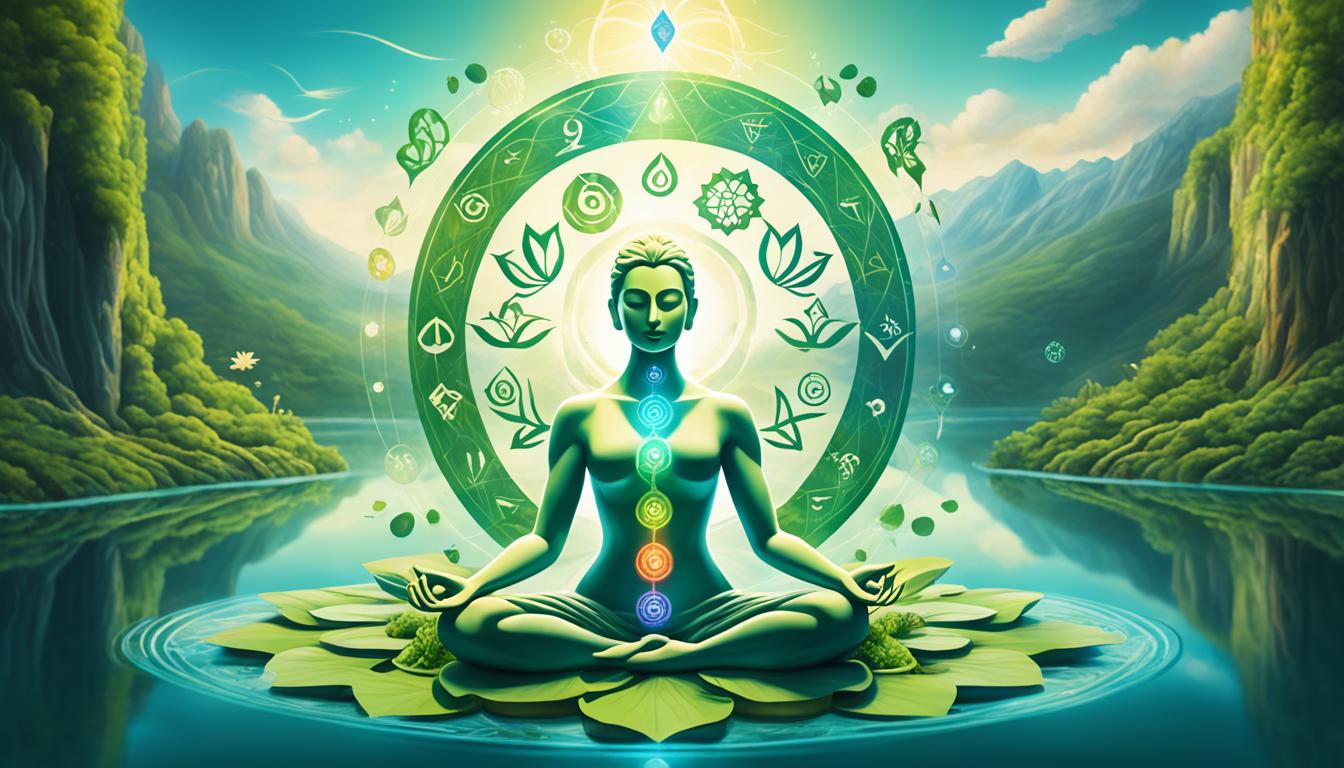Have you ever wondered what happens after death? Is there a deeper purpose to our existence beyond this lifetime? Buddhism offers profound insights into these existential questions through the concept of reincarnation. But what does reincarnation really mean in the context of Buddhism? How does it shape our understanding of morality, interconnectedness, and the pursuit of enlightenment? Let’s embark on a journey within to explore the depths of Buddhism reincarnation.
Key Takeaways:
- Reincarnation is a fundamental principle in Buddhism, highlighting the cyclical nature of existence and the interconnection of all sentient beings.
- Karma, the law of cause and effect, plays a crucial role in shaping future incarnations and holding individuals accountable for their actions.
- The pursuit of wisdom, enlightenment, and liberation from the cycle of Samsara is central to the understanding of reincarnation in Buddhism.
- Reincarnation invites contemplation on the impermanence of life and the importance of cultivating detachment from worldly desires and attachments.
- Compassion and empathy towards oneself and others are fostered by the recognition of suffering as an inherent aspect of Samsara.
Karma and Moral Accountability
Karma, the law of cause and effect, is intricately woven into the fabric of reincarnation in Buddhism. It serves as a powerful feedback mechanism, holding every individual accountable for their actions not just in this lifetime, but across lifetimes. The concept of karma emphasizes that every choice we make, every action we take, carries consequences that extend far beyond our immediate existence.
In Buddhism, karma is closely intertwined with the belief in reincarnation. It is believed that the actions we take in each lifetime contribute to the accumulation of positive or negative karma, which in turn shapes our future rebirths. Reincarnation, therefore, serves as a mechanism through which the repercussions of our actions are experienced and balanced.
By recognizing the ethical implications of our choices, we can strive to cultivate positive karma and break free from the cycle of suffering and rebirth. Living in alignment with moral principles, practicing compassion, and choosing virtuous conduct are essential aspects of reincarnation in Buddhism.
The Interplay of Karma and Reincarnation
When we understand that our actions have far-reaching consequences, it naturally leads to a sense of moral accountability. In Buddhism, the law of karma teaches us that our choices determine the quality of our future lives and the experiences we will encounter on our journey of reincarnation.
Consider the table below which illustrates the interplay between karma and reincarnation in Buddhism:
| Karma | Reincarnation |
|---|---|
| An individual accumulates positive or negative karma through their actions. | Reincarnation serves as the vehicle through which the consequences of karma are experienced. |
| Karma influences the circumstances of future rebirths. | Reincarnation provides opportunities for individuals to continue their spiritual journey, learn from past lives, and cultivate wisdom. |
| Virtuous actions lead to positive karma and the potential for a more favorable rebirth. | Reincarnation offers the chance to progress towards enlightenment and liberation from the cycle of suffering. |
| Non-virtuous actions accumulate negative karma and may result in a more challenging or unfavorable rebirth. | Reincarnation serves as a mechanism through which negative karma is balanced, creating opportunities for growth and transformation. |
As the table highlights, karma and reincarnation are intimately interconnected. The choices we make in each life shape the trajectory of our future rebirths, providing the canvas on which we continue to refine our spiritual evolution.

The Wheel of Samsara: A Cosmic Tapestry
Reincarnation is a part of the cosmic cycle of Samsara, which encompasses all sentient beings. It emphasizes the interconnectedness of life forms and highlights the influence of past actions and relationships on current and future rebirths. Through the cycle of Samsara, individuals experience the consequences of their karma, shaping their journey of Samsara and the opportunities for growth and liberation.
In Buddhism, Samsara represents the continuous cycle of birth, death, and rebirth. It is likened to a wheel that keeps turning, trapping souls in an eternal loop of existence until they attain enlightenment and break free from the cycle. This cycle is driven by the force of karma, which accumulates from one lifetime to the next.
Understanding Samsara
At the heart of Samsara is the concept of rebirth, where the cycle of birth, death, and rebirth is repeated ceaselessly. The interconnectedness of all beings is fundamental in Buddhism, as each life is influenced by the actions, desires, and relationships of past lives. This understanding fosters compassion and empathy among practitioners, as they recognize that all beings are caught in the same cosmic tapestry of Samsara.
According to Buddhist teachings, the cycle of Samsara is driven by desire, attachment, and ignorance. Beings are bound to this cycle due to their cravings and delusions, which perpetuate suffering and prevent them from attaining enlightenment. Reincarnation provides the space for growth, learning, and the opportunity to break free from the cycle of Samsara.
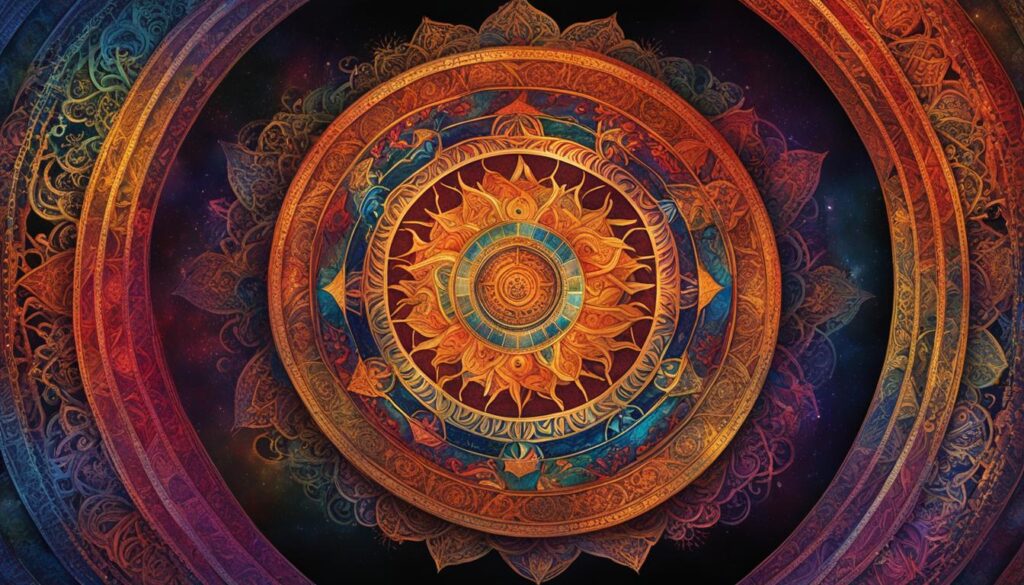
The Cycle of Samsara
The cycle of Samsara consists of six realms, each representing different states of existence. These realms include:
| Realm | Description |
|---|---|
| Gods/Devas | Beings experiencing heavenly pleasures due to their positive karma |
| Demigods/Asuras | Beings involved in constant battles and conflicts |
| Humans | Beings with the opportunity for spiritual growth and enlightenment |
| Animals | Beings driven by instinct and basic survival needs |
| Pretas/Ghosts | Beings trapped in a state of constant craving and insatiable desires |
| Hells | Beings experiencing intense suffering due to negative karma |
These realms are not fixed destinations but rather states of existence that beings may enter and exist in based on their karma. The wheel of Samsara spins continuously as individuals move through these realms, ultimately seeking liberation from the cycle.
As illustrated in the image above, the wheel of Samsara represents the endless cycle of birth, death, and rebirth. At its core lies the three poisons of greed, hatred, and ignorance, which perpetuate the cycle and keep beings bound to Samsara. Breaking free from this cycle requires cultivating wisdom, compassion, and ethical conduct to purify karma and attain enlightenment.
In the next section, we will explore the quest for wisdom and enlightenment within the context of Buddhism and the cycle of Samsara.
A Quest for Wisdom and Enlightenment
Reincarnation, a fundamental belief in Buddhism, plays a profound role in the spiritual journey of individuals. It serves as a backdrop, highlighting the cyclical nature of ignorance and offering opportunities for personal growth and transformation. Through multiple lifetimes, practitioners have the chance to gain wisdom and profound insights into the nature of existence.
Reincarnation in Buddhism is not a linear progression but exists on different levels, each representing a unique opportunity for learning and self-discovery. As individuals navigate these levels of reincarnation, they unravel the layers of ignorance and gain deeper understanding.
The Levels of Reincarnation in Buddhism
- The Lower Realms: In these realms, individuals experience intense suffering due to their negative actions and ignorance. These realms include the animal realm, hungry ghost realm, and hell realm. Reincarnating within these realms presents challenges that test one’s ability to transcend desires, attachments, and negative behaviors.
- The Human Realm: The human realm is considered a precious opportunity for spiritual growth. Humans have the capacity for self-awareness, reasoning, and making choices. It is in this realm that individuals can cultivate virtuous conduct, wisdom, and compassion, ultimately progressing towards enlightenment.
- The God Realms: These realms represent heightened states of happiness and pleasure. While being reborn in the god realms offers temporary bliss, it is also associated with a greater risk of becoming attached to pleasurable experiences and neglecting the spiritual path. The gods are perceived as impermanent and subject to change, reminding individuals of the transient nature of existence.
Seeking Liberation from Samsara
The ultimate goal of the spiritual journey in Buddhism is to attain liberation from the cycle of Samsara, which encompasses all realms of existence. Reincarnation serves as a catalyst for this quest, as each life offers new opportunities to cultivate wisdom, compassion, and the qualities necessary for enlightenment.
Buddhists strive to break free from the limitations of worldly existence, transcending the cycle of birth and death. The attainment of enlightenment, known as Nirvana, marks the end of the journey and liberation from the suffering inherent in Samsara.

| Levels of Reincarnation | Description |
|---|---|
| The Lower Realms | Realms characterized by intense suffering. These include the animal realm, hungry ghost realm, and hell realm. Individuals in these realms face challenges that test their ability to transcend negative behaviors and desires. |
| The Human Realm | The human realm offers the opportunity for spiritual growth. With self-awareness and reasoning abilities, humans can cultivate virtuous conduct, wisdom, and compassion, progressing towards enlightenment. |
| The God Realms | Realms of heightened happiness and pleasure. While offering temporary bliss, being reborn in these realms carries the risk of attaching to pleasurable experiences and neglecting the spiritual path. |
Embarking on the quest for wisdom and enlightenment, Buddhists recognize the cyclical nature of existence and embrace the transformative power of reincarnation. With each new life, they move closer to liberation, transcending the limitations of Samsara and attaining the ultimate goal of spiritual awakening.
Impermanence and Detachment
Reincarnation in Buddhism highlights the profound understanding of the impermanence of life and the significance of cultivating detachment from material possessions, desires, and attachments. By recognizing and accepting the transient nature of existence, practitioners can navigate life’s complexities and challenges with wisdom and equanimity.
Impermanence, or anicca, is one of the core principles in Buddhism. It teaches that all conditioned phenomena are in a constant state of change and flux. From the rising and setting of the sun to the cycles of birth and death, impermanence permeates every aspect of our existence.
Understanding impermanence is essential to comprehending the concept of rebirth in Buddhism. Just as a flame is passed from one candle to another, life is seen as an unbroken continuity, with each individual being part of an ever-flowing stream of existence. Reincarnation offers an opportunity for individuals to continue their personal and spiritual growth as they progress through different lifetimes.
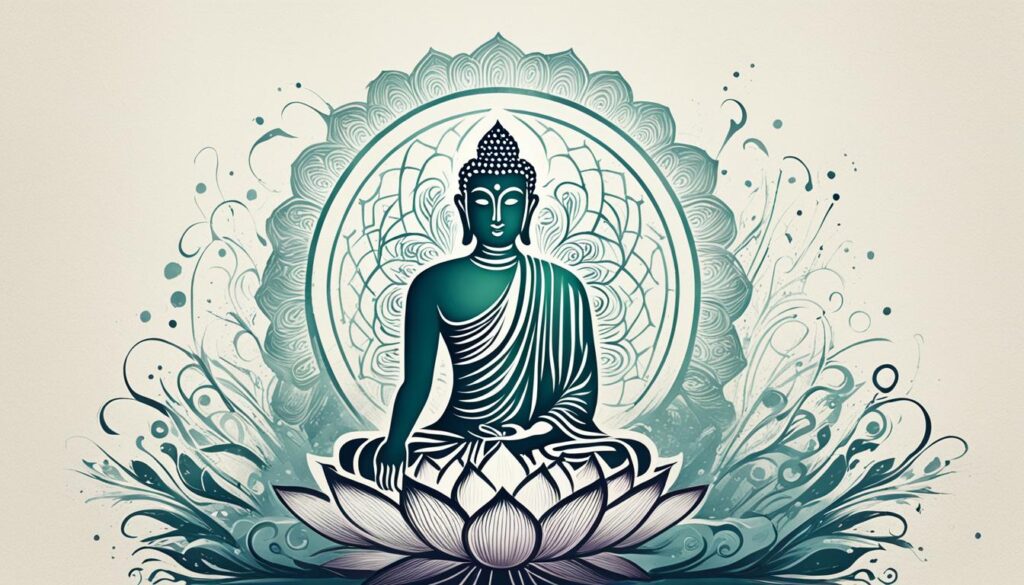
In this context, detachment plays a pivotal role. Detachment does not imply indifference or apathy; rather, it is a state of mind that allows individuals to let go of clinging to transient phenomena. By recognizing the impermanence of material possessions, desires, and attachments, practitioners cultivate an inner sense of freedom, resilience, and contentment.
Detachment, also known as non-attachment or renunciation, is not about abstaining from enjoyment or denying oneself pleasure. It is about developing a healthy relationship with the external world, embracing life’s pleasures while understanding their transient nature. By not being bound by external circumstances, individuals can find lasting peace and satisfaction within themselves.
The Path to Detachment
The path to detachment in Buddhism involves cultivating mindfulness, wisdom, and compassion. By observing the impermanent nature of thoughts, emotions, and physical sensations, individuals begin to detach themselves from identification with a fixed and unchanging self. This practice of self-inquiry allows practitioners to transcend the limitations of ego and tap into their inherent wisdom and interconnectedness with the world.
- Mindfulness: Through the practice of mindfulness, individuals develop a deep awareness of the present moment, observing thoughts, emotions, and sensations without judgment or attachment. This heightened awareness helps cultivate a sense of detachment from the constantly changing nature of experience.
- Wisdom: Wisdom, or prajna, is the discerning understanding of the nature of reality. It arises from deep contemplation and the direct experience of impermanence and interconnectedness. Wisdom allows individuals to see the transient nature of phenomena and recognize the futility of clinging to them.
- Compassion: Compassion, or karuna, is an essential quality in Buddhism. By cultivating compassion towards all beings, individuals develop a sense of interconnectedness and empathy. Compassion encourages selflessness and an understanding that all beings share the common bond of impermanence and the potential for growth and transformation.
As individuals embrace impermanence and cultivate detachment, they become less entangled in the desires, attachments, and aversions that cause suffering. Detachment brings freedom from the cycle of craving and dissatisfaction, allowing practitioners to experience life with equanimity and joy.
| Benefits of Detachment in Buddhism | Practices for Cultivating Detachment |
|---|---|
| 1. Freedom from suffering | 1. Mindfulness meditation |
| 2. Inner peace and contentment | 2. Reflecting on impermanence |
| 3. Reduced stress and anxiety | 3. Letting go of attachments |
| 4. Increased clarity and wisdom | 4. Practicing non-attachment |
| 5. Enhanced compassion and empathy | 5. Cultivating gratitude |
Compassionate Response to Suffering
Reincarnation in Buddhism provides a profound framework for understanding the nature of suffering within the cycle of rebirth. It acknowledges that suffering is an inherent aspect of Samsara, the eternal cycle of birth and death. This understanding gives rise to a deep sense of compassion towards oneself and others who are also on the journey of suffering and growth.
As you explore the teachings of Buddhism, you will come to recognize that the pursuit of enlightenment is a transformative quest to alleviate the suffering of all beings. It is an endeavor to break free from the repetitive cycle of rebirth and attain liberation from the bonds of existence.
The belief in karma and rebirth underscores the interconnectedness of all living beings. It reminds us that each individual’s actions and intentions have far-reaching consequences, not only in this lifetime but in future incarnations. This awareness nurtures empathy and encourages a compassionate response to the suffering of others.
The Cycle of Rebirth and Compassion
Within the Buddhist philosophy, the cycle of rebirth serves as a reminder that no being is exempt from suffering. It prompts us to extend our compassion not only to those in our immediate vicinity but also to all sentient beings who share in the experience of Samsara.
Through the realization that we have all been entangled in this cycle of birth and death, we deepen our understanding of the fundamental interconnectedness of all living beings. This understanding fosters compassion, leading us to support and uplift others in their journeys towards enlightenment.
As you navigate the path of Buddhism, you will discover that cultivating compassion is not limited to alleviating the suffering of others. It also involves practicing self-compassion, recognizing your own struggles and extending kindness and understanding towards yourself.
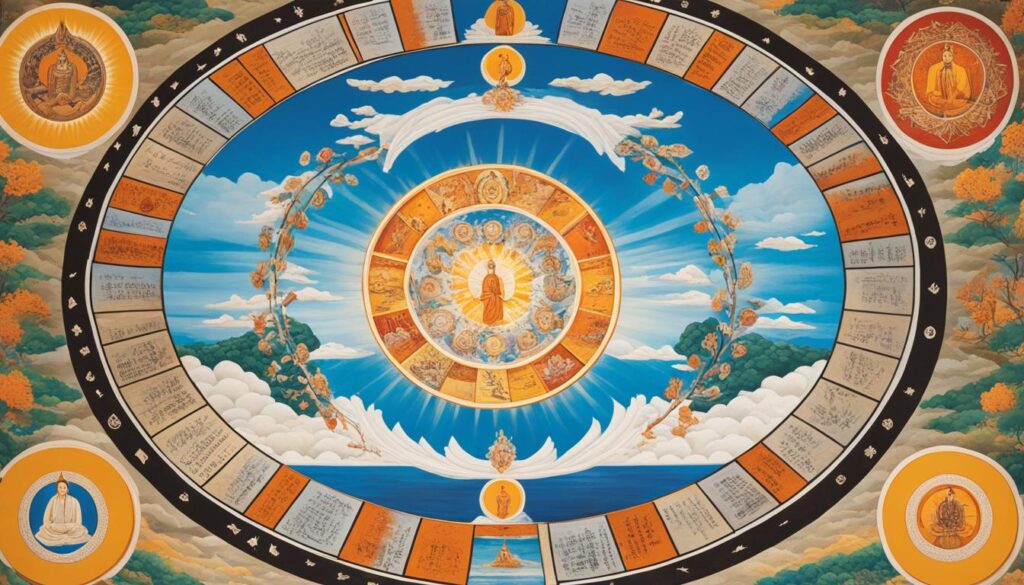
The Power of Compassionate Action
Compassionate action, motivated by the understanding of karma and rebirth, plays a vital role in the pursuit of enlightenment. It involves actively working to reduce the suffering of others, whether through acts of kindness, charitable deeds, or promoting justice and equality.
By engaging in compassionate actions, we contribute to the collective growth and liberation of all beings. Our intentions and actions shape our future incarnations and have the potential to create positive ripples throughout the eternal tapestry of existence.
As you embody compassion in your thoughts, words, and deeds, you not only uplift others but also cultivate a deep sense of purpose and fulfillment in your own spiritual journey. Compassion becomes the guiding light that illuminates your path towards enlightenment.
The Origins of Reincarnation
The concept of reincarnation has its roots in ancient civilizations, including Hinduism and Buddhism. In Hinduism, the belief in the eternal cycle of birth, death, and rebirth is referred to as samsara. Buddhism, on the other hand, places great emphasis on the role of karma in determining future incarnations. Through the law of cause and effect, individuals accumulate karma in each life, shaping their subsequent rebirths.
Reincarnation is not limited to Hinduism and Buddhism, as similar beliefs can be found in various cultures around the world. From Native American tribes to African religions and indigenous traditions, the fascination with the eternal cycle of life has been ingrained in the human psyche for centuries.
| Culture | Belief |
|---|---|
| Hinduism | Samsara: The continuous cycle of birth, death, and rebirth. |
| Buddhism | Karma and Rebirth: Karma determines the quality of one’s future life. |
| Native American | Transmigration: The spirit of the deceased is reborn in a new form. |
| African Religions | Ancestor Veneration: Ancestors are believed to be reborn in descendants. |
| Celtic Mythology | Transmigration: The soul passes from one body to another at death. |
Reincarnation, in all its forms, offers a profound reflection on the mysteries of life and death. It presents an opportunity to explore the interconnectedness of existence and the potential for growth and spiritual evolution through multiple lifetimes.

Cultural Variations in Reincarnation
Reincarnation takes on different forms across cultures, adapting to their unique beliefs and values. Understanding the diverse perspectives on reincarnation provides a nuanced view of this profound concept. Let’s explore some cultural variations:
Tibetan Buddhism
Tibetan Buddhism places great significance on the identification of the reincarnated Dalai Lama, the spiritual leader of the tradition. Through intricate rituals and the guidance of spiritual masters, the search for the Dalai Lama’s reincarnation continues the lineage of wisdom and compassion.
Jainism
In Jainism, an ancient Indian religion, the focus lies in breaking the cycle of reincarnation through non-violence and self-discipline. Practitioners strive to purify their karma and achieve spiritual liberation, ultimately escaping the cycle of birth and death.
New Age Movement
In Western societies, the New Age movement has popularized explorations of reincarnation. Many individuals seek to uncover past lives and gain insights into their present existence through methods like past life regression therapy. The belief in multiple incarnations aligns with the desire for personal growth and self-discovery.
Comparison: Tibetan Buddhism, Jainism, and New Age Movement
| Cultural Tradition | Approach to Reincarnation |
|---|---|
| Tibetan Buddhism | Identifying the reincarnated Dalai Lama through rituals and spiritual guidance. |
| Jainism | Breaking the cycle of reincarnation through non-violence and self-discipline. |
| New Age Movement | Exploring past lives through methods like past life regression therapy. |
The table above highlights the distinct approaches taken by Tibetan Buddhism, Jainism, and the New Age movement in relation to reincarnation. While each tradition may have differing practices, they all provide avenues for spiritual exploration and personal growth.
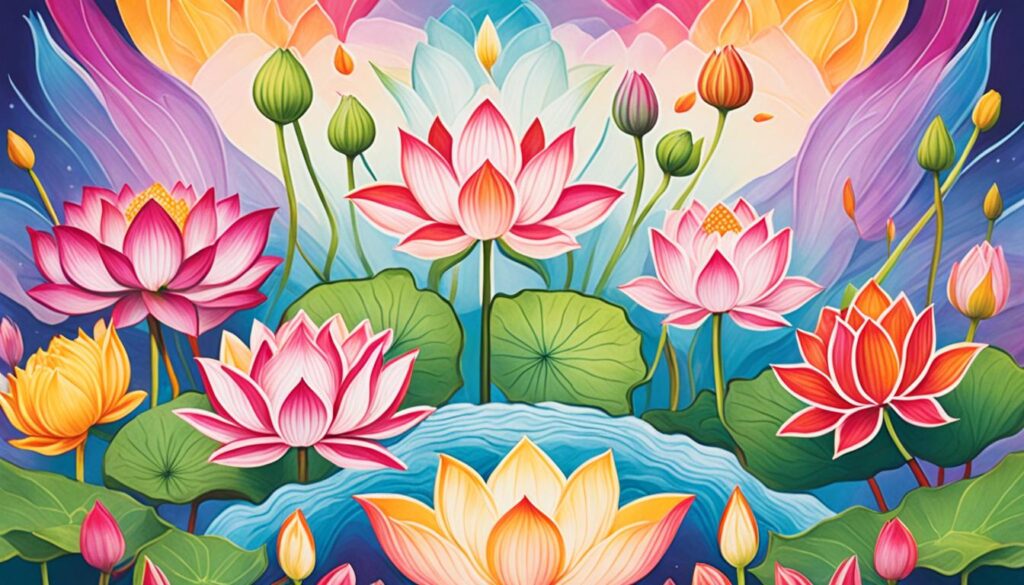
Image: A visual representation of the cultural variations in reincarnation.
Reincarnation and Personal Growth
The belief in reincarnation offers profound opportunities for personal growth and self-discovery. It invites you to reflect upon and learn from past experiences, empowering you to evolve and transform as a soul. By recognizing the ethical implications of your actions in one life shaping future incarnations, you gain a deeper understanding of the interconnectedness and consequences of your choices.
Reincarnation in Buddhism encourages you to cultivate compassion, self-improvement, and a profound understanding of your place within the cycle of rebirth. It serves as a reminder that your journey is not confined to a single lifetime but spans a continuum of existence, filled with learning, growth, and spiritual development.
This belief in the continuity of life offers a fresh perspective on your current experiences and challenges. Instead of viewing setbacks as failures, you may perceive them as opportunities for growth and enlightenment. The concept of rebirth emphasizes that each life is a stepping stone in your spiritual maturation, allowing you to embody virtues and transcend the limitations imposed by worldly existence.
Learning from Past Experiences
The belief in reincarnation prompts you to reflect on the lessons and wisdom acquired throughout your soul’s journey. By connecting with the memories and experiences of previous lives, you can gain insights into patterns, strengths, and areas for personal development. This self-reflection enables you to break free from old habits, ingrained behaviors, and negative karmic cycles, empowering you to make conscious choices aligned with your highest self.
Cultivating Compassion and Empathy
Understanding that you and others have traversed numerous lives fosters a deep sense of compassion and empathy. When you recognize the shared journey of suffering and growth, it becomes easier to view others with kindness, patience, and understanding. The belief in reincarnation invites you to extend empathy not only to those in your immediate circle but to all sentient beings, forging bonds rooted in compassion and interconnectedness.
The Path to Self-Improvement
Reincarnation encourages a continual process of self-improvement and spiritual growth. Each life presents an opportunity to overcome weaknesses, cultivate virtues, and refine your character. By embracing this cycle of self-transformation, you can embark on a journey of self-exploration, honing your skills, expanding your consciousness, and progressing towards the ultimate goal of emancipation from the perpetual cycle of birth and death.
The Cycle of Rebirth and Self-Realization
The belief in rebirth emphasizes that your journey extends beyond this present existence. It invites you to contemplate the profound questions of existence, seeking to unravel the mysteries of the soul and the eternal tapestry of life. By recognizing your immortal essence and the potential for spiritual evolution, you embark on a path of self-realization, expanding your consciousness and breaking free from the limitations of Samsara.
As you strive to navigate the cycle of rebirth and strive for self-realization, remember to embrace compassion, self-improvement, and an open mind. The belief in reincarnation offers endless possibilities for growth and understanding, providing a roadmap for personal evolution and the pursuit of enlightenment.
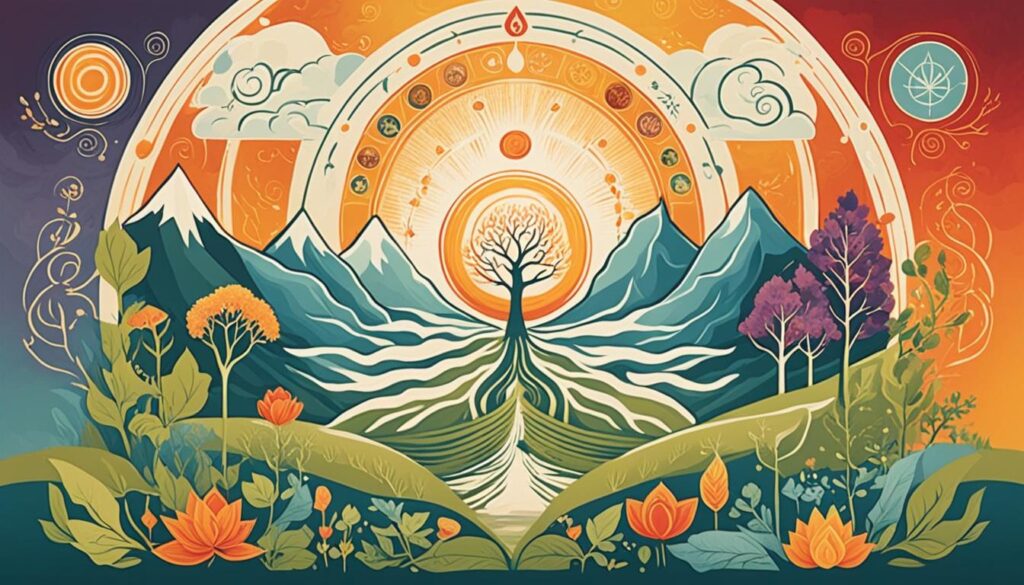
The Quest for Liberation
Reincarnation in Buddhism is intricately tied to the pursuit of liberation from the cycle of birth and death. The ultimate goal is to transcend the limitations of worldly existence and achieve Nirvana. Practitioners strive to end the cycle of reincarnation and free themselves from the suffering inherent in Samsara.
The cycle of birth, death, and rebirth in Buddhism, known as Samsara, is a continuous journey of exploration and spiritual growth. It is believed that each life offers opportunities to learn and evolve, moving closer to the ultimate liberation.
Karma and reincarnation in Buddhism are deeply interconnected. Karma, the law of cause and effect, influences the circumstances of each rebirth. Positive actions and intentions lead to favorable future incarnations, while negative actions generate unfavorable consequences in the cycle of rebirth.
“Your choices and actions shape your future experiences, affecting the trajectory of your spiritual journey.”
Reincarnation is an essential component of Buddhist teachings and philosophy. It acknowledges the interdependence of all beings and provides a framework for understanding the nature of existence. Through the cycle of birth and death, individuals have the opportunity to cultivate wisdom, compassion, and ethical conduct.
To achieve liberation from Samsara, practitioners must break the cycle of reincarnation by transcending attachment and desire. This requires cultivating mindfulness, understanding the impermanence of all phenomena, and seeking enlightenment.
“In the pursuit of liberation, you strive to free yourself from the constant cycle of birth, death, and rebirth.”
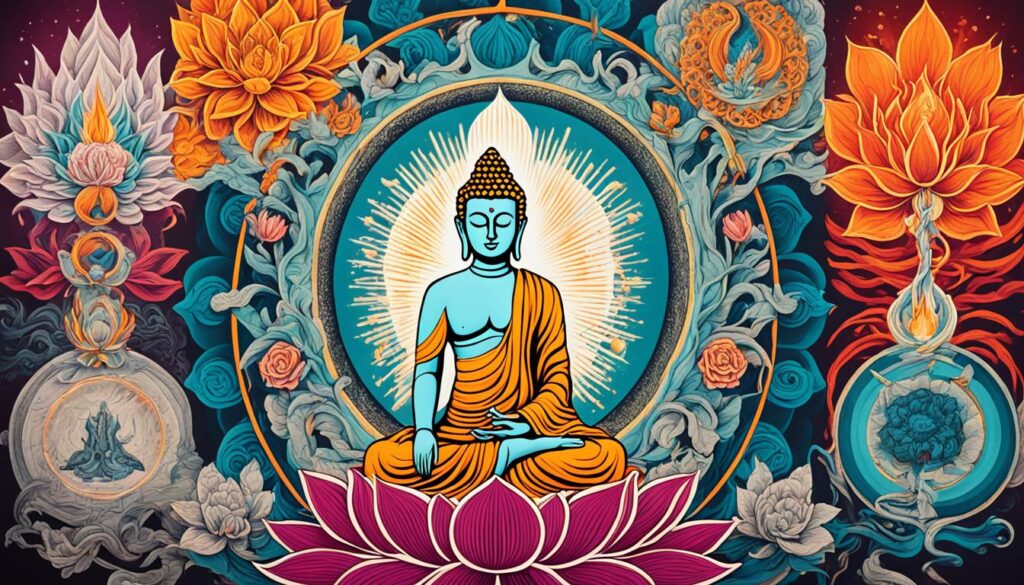
Exploring the Mysteries: The Nature of the Soul
Reincarnation in Buddhism is a gateway to contemplating the profound nature of the soul and the eternal cycle of life and death. While cultural beliefs and interpretations may differ, the core tenet of the soul’s continuity and its evolution through multiple incarnations remains central. This belief system poses profound questions about the essence of our being and offers glimpses into the limitless possibilities of spiritual growth and transformation.
Contemplating the Essence
Reincarnation invites us to ponder the fundamental nature of the soul and the eternal journey it embarks upon through various lifetimes. It challenges us to explore the deepest aspects of our existence and grapple with existential questions. What is the soul? What is its purpose? Where does it come from, and where is it destined to go? These timeless mysteries open doors to self-discovery and spiritual exploration.
Reincarnation holds that the soul is an eternal essence that transcends our mortal lives. It is not confined by time, space, or material existence. Rather, the soul’s journey spans countless lifetimes, each contributing to its growth and enlightenment.
Endless Cycles of Birth and Death
The cycle of reincarnation presents an eternal tapestry of birth, death, and rebirth. This cyclical nature mirrors the ebb and flow of life, highlighting the impermanence and interconnectedness of all beings. Through the experience of numerous incarnations, the soul gains wisdom, evolves, and moves forward on its spiritual path.
Reincarnation teaches us that life is not a linear journey with a singular beginning or end. Instead, it is a continuous cycle of birth and death, where each existence builds upon the knowledge and lessons of the past.
The Evolutionary Leap
Reincarnation suggests that each lifetime offers an opportunity for the soul to evolve and ascend to higher levels of consciousness. As we learn from our experiences, cultivate wisdom, and transcend our karmic patterns, we take an evolutionary leap in our spiritual growth.
The journey of reincarnation propels us toward greater self-realization and enlightenment. It empowers us to expand our understanding, deepen our compassion, and embrace the interconnectedness of all existence.
Visualizing the Eternal Journey
| Key Concepts | Symbolism |
|---|---|
| Soul | Infinity symbol (∞), representing eternal existence |
| Birth, Death, and Rebirth | Mobius strip, signifying the continuous cycle of life |
| Spiritual Growth | Ascending staircase, illustrating the evolution of consciousness |
The table above offers a visual representation of the key concepts related to the nature of the soul and the eternal journey of reincarnation. It symbolizes the infinite nature of the soul, the cyclical pattern of birth and death, and the transformative process of spiritual growth.
As we explore the profound mysteries of the soul and the eternal cycle of life and death, we embark on a journey of self-discovery and spiritual evolution. Reincarnation in Buddhism encourages us to contemplate the depths of our being, embrace the interconnectedness of all existence, and discover our own transformative potential on the path to enlightenment.
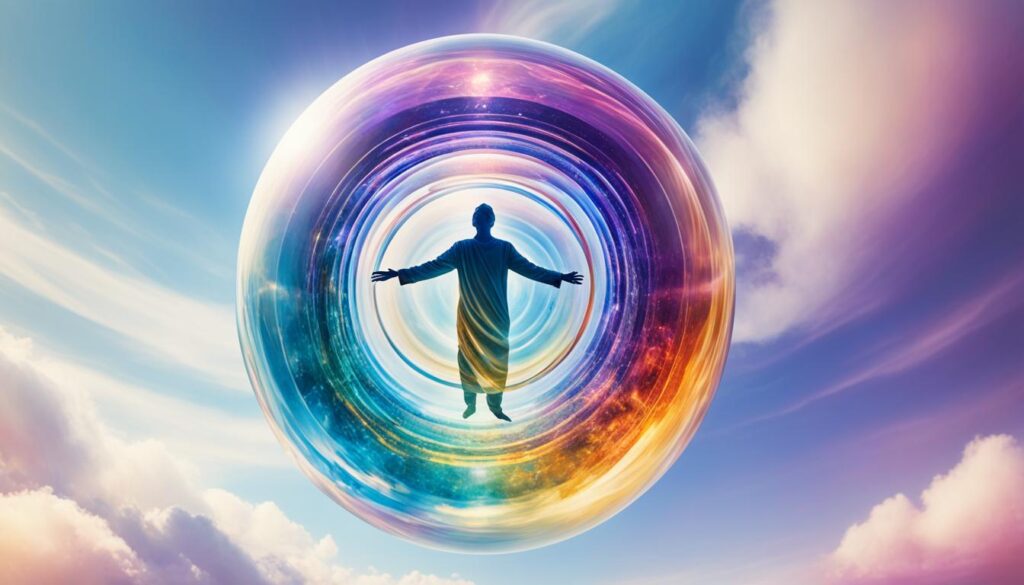
Reincarnation and Connection with Ancestors
The concept of reincarnation in Buddhism offers a profound sense of continuity and connection with our ancestors. It is believed that departed souls may be reborn in new bodies, providing comfort and allowing us to honor the legacies of our ancestors. This belief fosters an understanding of the intergenerational nature of existence and highlights the importance of remembering and paying homage to those who came before us.
Embracing the idea of reincarnation encourages a deep sense of connection with our lineage, appreciating the wisdom and experiences passed down through generations. It reminds us that we are not isolated beings, but rather part of an intricate tapestry of life, woven by the interconnected threads of birth, death, and rebirth.

Continuity and Comfort
The belief in reincarnation allows us to find solace in the notion that our loved ones who have passed away may continue their journey in new forms. This belief offers a sense of continuity, assuring us that our connection with them transcends physical death. It brings comfort, knowing that their presence and influence persist in the cycle of rebirth.
By actively acknowledging and honoring our ancestors, we acknowledge their impact on our lives and recognize the wisdom and teachings they have imparted, which continue to shape and guide us. This connection fosters gratitude, appreciation, and a deeper understanding of our roots and lineage.
The Intergenerational Nature of Existence
Reincarnation reinforces the intergenerational nature of existence, highlighting the imprints left by our ancestors on our present lives. Their experiences, virtues, and strengths are carried forward, becoming a part of our own journeys. By recognizing this intergenerational connection, we can gain a broader perspective on our lives and gain insights into the challenges and opportunities that have been inherited.
Understanding our connection with our ancestors encourages us to reflect upon their struggles, triumphs, and legacies. We can draw inspiration from their stories, learning from their mistakes, and embracing their successes. This understanding fosters a sense of gratitude and responsibility to carry forward their teachings, values, and virtues to future generations.
By honoring our ancestors and embracing the belief in reincarnation, we nurture a deep appreciation for the interconnectedness of all beings throughout time. We recognize that we are but a small part of a larger cosmic tapestry, where the threads of countless lives are woven together. This realization deepens our empathy, compassion, and awareness of the impact our actions have on future generations.
In the next section, we will explore the scientific investigations and studies that shed light on the phenomenon of reincarnation and its potential mechanisms.
The Science Behind Reincarnation
While the concept of reincarnation in Buddhism is often regarded as metaphysical or mystical, it has also piqued the interest of scientific researchers. By studying cases where children claim to remember past lives, researchers aim to explore the potential mechanisms and validity of reincarnation as a phenomenon. These investigations shed light on the intriguing question of how reincarnation works in Buddhism and whether there is scientific evidence to support its existence.
Children Remembering Past Lives: An Insightful Path
A fascinating area of research focuses on children who spontaneously recall detailed memories of past lives. These children often provide specific information about individuals, places, and events from a previous lifetime, seemingly beyond the scope of their personal experiences. Researchers carefully document and validate these accounts, examining their consistency, accuracy, and connections to verifiable historical facts.
One well-known researcher in this field is Dr. Ian Stevenson, a psychiatrist who dedicated decades to studying children’s past-life memories. He meticulously documented thousands of cases and published his findings in books such as “Twenty Cases Suggestive of Reincarnation” and “Where Reincarnation and Biology Intersect.”
Stevenson’s work reveals striking patterns and correlations between the experiences of these children and the lives of individuals they claim to have been in previous incarnations. The details provided often go beyond coincidental knowledge, prompting further exploration into the workings of reincarnation.
The 49-Day Bardo: A Bridge Between Lives
Buddhist teachings suggest that after death, the consciousness enters a transitional state known as the Bardo. The Bardo lasts for approximately 49 days, during which the deceased individual navigates various realms before taking on a new incarnation. This transitional period holds significant importance in the understanding of how reincarnation unfolds in Buddhism.
The term “Bardo,” derived from Tibetan Buddhism, refers to a psychological state that encompasses different stages characterized by a range of experiences and manifestations of consciousness. It serves as a bridge connecting the past life’s death and the future life’s rebirth.
Buddhist scriptures, such as “The Tibetan Book of the Dead,” provide detailed instructions and guidance for practitioners to navigate the Bardo consciously. These teachings aim to prepare individuals for the cyclical journey of rebirth and liberation from the cycle of Samsara.
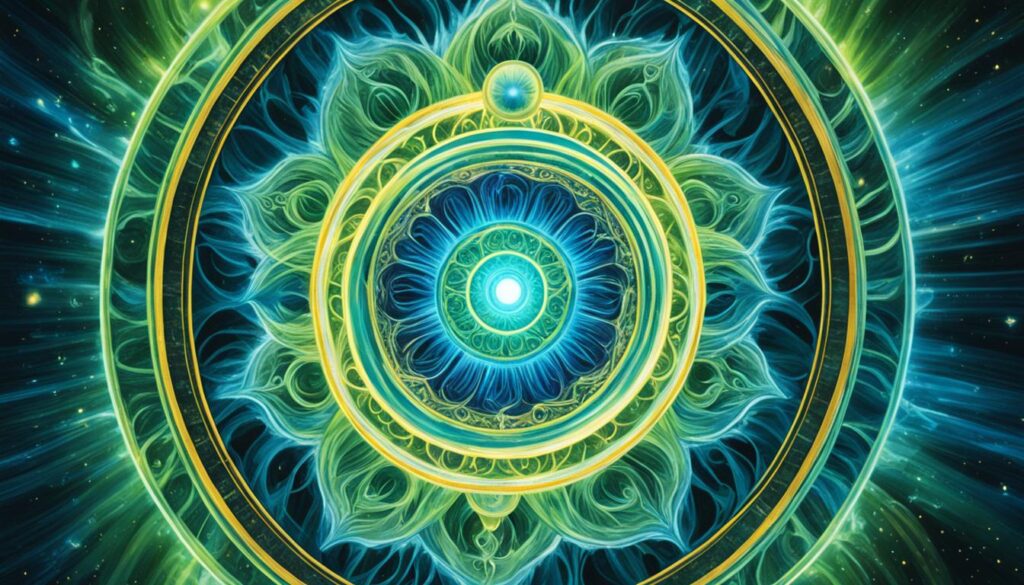
Studies into children’s past-life memories and the exploration of the Bardo offer fascinating glimpses into the science behind reincarnation in Buddhism. While these findings may not provide definitive proof, they offer insights into the potential mechanisms and phenomenology of this ancient belief.
Exploring the Mechanics of Reincarnation
Scientific inquiries delve into the mechanics of reincarnation, examining various theories to explain how the process might work. Some propose that consciousness and memories are carried forward from one lifetime to another, while others suggest the existence of a cosmic information field that stores past-life experiences.
Quantum physics and theories related to consciousness provide additional avenues for exploring the science behind reincarnation. Concepts such as non-locality and entanglement suggest that consciousness may transcend physical boundaries and exist independently of the physical body.
However, it is essential to acknowledge that the study of reincarnation remains complex, and definitive proof is yet to be found. The nature of consciousness, with its profound mysteries and intricacies, continues to elude our complete understanding.
The Journey Continues: Reincarnation in Buddhism
As science and spirituality intersect, the ongoing investigation into the science behind reincarnation in Buddhism adds depth to our understanding of this ancient belief. While much remains to be discovered, the exploration of empirical evidence and the intriguing accounts of children remembering past lives offer thought-provoking insights, inspiring further contemplation, and opening doors to the realm of possibility.
Exploring Past Lives: Regression Therapy
Past life regression therapy, a spiritual and psychological practice, has gained popularity in exploring the concept of reincarnation. Through hypnosis, individuals seek to access memories from past lives, hoping to gain insights, healing, and a deeper understanding of their present existence. This therapy aligns with the belief in the continuity of the soul and the potential for growth through multiple incarnations.
The journey of exploring past lives through regression therapy can be a transformative and enlightening experience. By delving into the depths of the subconscious mind, individuals can uncover hidden memories, emotions, and patterns that may have originated in previous lifetimes. Through skilled guidance, regression therapists help people tap into their past life memories, unlocking a new realm of self-discovery and personal growth.
During a past life regression session, you may find yourself transported to distant lands and different time periods, experiencing vivid sensations, emotions, and details from a previous existence. These memories can provide profound insights into your current relationships, interests, talents, and challenges, shedding light on the journey of your soul.
Through regression therapy, you can explore the karmic imprints that you bring from past lives, understanding how they shape your present experiences, relationships, and circumstances. This process allows for a deeper recognition of the interconnectedness between your past and present, providing clarity and a sense of purpose on your spiritual path.
Reincarnation, as experienced through regression therapy, offers an opportunity for healing and resolution. By revisiting past life traumas or unfinished business, individuals can release emotional blockages and find closure. This newfound awareness and healing can have a transformative effect on your current life, empowering you to overcome obstacles, break negative patterns, and live more authentically.
The Benefits of Regression Therapy for Exploring Past Lives
Regression therapy offers a range of potential benefits for those seeking to explore their past lives:
- Insights and self-understanding: By accessing past life memories, you can gain a deeper understanding of yourself, your relationships, and your life’s purpose.
- Healing and closure: Regression therapy provides an opportunity to heal past life traumas, release emotional burdens, and find closure.
- Integration and transformation: The exploration of past lives can assist in integrating past experiences, allowing for personal growth and transformation.
- Spiritual awakening: Regression therapy can awaken spiritual insights, expanding your consciousness and deepening your connection to the divine.
- Karmic resolution: By exploring past lives, you can gain awareness of karmic patterns and work towards resolving them, promoting personal and spiritual development.

Embarking on a regression therapy journey requires an open mind, a willingness to explore the unknown, and trust in the process. Whether you are seeking self-discovery, healing, or a deeper understanding of the eternal nature of your soul, regression therapy can provide a fascinating and transformative exploration of your past lives.
Unveiling the Future: Breaking the Cycle
In Buddhism, the concept of reincarnation is closely intertwined with the pursuit of liberation from the perpetual cycle of birth and death. To end the cycle of reincarnation, practitioners embark on a transformative journey guided by the teachings of Buddhism.
Central to this quest is the cultivation of wisdom, ethical conduct, and mindfulness. By developing a deep understanding of the nature of existence, individuals can purify their karma and transcend the limitations of Samsara, the cycle of rebirth.
The ultimate goal is to break free from the perpetual cycle of birth and death and attain spiritual liberation, reaching a state of enlightenment and transcending the sufferings of worldly existence.

This image visually represents the concept of breaking the cycle of reincarnation in Buddhism. It serves as a reminder of the goal of liberation from the perpetual cycle of birth and death, inspiring practitioners on their spiritual journey.
Guiding Principles on the Path to Liberation
To end the cycle of reincarnation, Buddhism offers a set of guiding principles:
- Cultivating Wisdom: Insight and understanding into the nature of existence and the workings of karma are crucial in breaking the cycle of rebirth. Through meditation, contemplation, and the study of Buddhist teachings, individuals develop the wisdom needed to transcend Samsara.
- Living Ethically: Practicing moral conduct, kindness, and compassion towards all beings helps individuals accumulate positive karma and purify negative karma. By embracing ethical principles such as the Five Precepts, practitioners create the foundation for liberation.
- Mindfulness and Meditation: The practice of mindfulness and meditation cultivates present-moment awareness and deepens inner calm. By developing mindfulness, individuals can observe the impermanence and interconnectedness of all things, transcending attachment and desires that perpetuate the cycle of reincarnation.
- Renunciation of Worldly Desires: Releasing attachments to material possessions, desires, and emotional attachments is essential in breaking the cycle of reincarnation. This renunciation allows practitioners to cultivate detachment and focus on the spiritual path.
Transcending Samsara: The Liberating Path
As individuals tread the liberating path, they progressively free themselves from the shackles of the cycle of birth and death. Each step brings them closer to the final liberation:
- First, individuals strive to attain a favorable rebirth, ensuring that future lives will provide the opportunities and conditions necessary to continue their spiritual journey.
- Next, practitioners aim to break free from Samsara through attaining enlightenment, transcending the limitations of worldly existence, and reaching the state of Nirvana.
Buddhist Teachings on Liberation
Buddhism offers various teachings that guide practitioners on how to break the cycle of reincarnation:
| Teaching | Description |
|---|---|
| The Four Noble Truths | Understanding and accepting the truths of suffering, the origin of suffering, the cessation of suffering, and the path leading to the cessation of suffering pave the way for liberation from Samsara. |
| The Eightfold Path | By following the path of right understanding, intention, speech, action, livelihood, effort, mindfulness, and concentration, individuals cultivate the qualities necessary for liberation. |
| The Three Marks of Existence | Recognizing the impermanence of all things, the inherent suffering in worldly existence, and the absence of a fixed self or soul reveals the path to liberation. |
The table above highlights some of the foundational teachings that support the journey towards liberation from the cycle of reincarnation.
By embracing these teachings, practicing meditation, and embodying the principles of Buddhism, individuals can uncover their own paths to liberation and break free from the perpetual cycle of birth and death.
Conclusion
Reincarnation is a profound aspect of Buddhism that provides deep insights into the nature of existence, the eternal cycle of life and death, and the quest for enlightenment. Through the belief in reincarnation, individuals are encouraged to embrace moral accountability for their actions, recognizing the profound impact they have on their future incarnations.
Buddhism teaches the interconnectedness of all beings, emphasizing the interdependence that exists within the cosmic tapestry of life. Reincarnation serves as a reminder of the intricate web that connects us all, fostering compassion, empathy, and a profound sense of responsibility towards ourselves and others.
Within the concept of reincarnation lies the potential for personal growth and self-discovery. The belief in multiple lifetimes encourages individuals to reflect on their past experiences, learn from them, and evolve as souls. It calls for the cultivation of wisdom, ethical conduct, and mindfulness as tools for breaking free from the cycle of Samsara and attaining spiritual liberation.
Whether viewed as a religious doctrine or a metaphysical belief, the concept of reincarnation inspires us to explore our place within the eternal tapestry of life. It beckons us to ponder the mysteries of the soul, our connection with ancestors, and the transformative power of compassionate actions. By embracing the profound teachings of reincarnation, we embark on a journey of self-discovery, striving to unleash our highest potential and ultimately find liberation from the cycle of birth and death.

